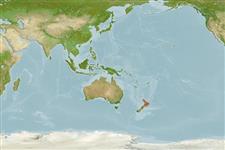分類 / Names
共通名の | 類義語 | Catalog of Fishes(部類, 種) | ITIS | CoL | WoRMS | Cloffa
>
Blenniiformes (Blennies) >
Tripterygiidae (Triplefin blennies) > Tripterygiinae
Etymology: Notoclinops: Greek, noton = back + Greek, klinein, kline = sloping and also bed, due to the four apophyses of sphenoid bone + Greek, ops = appearance (Ref. 45335).
Eponymy: Dr John Cameron Yaldwyn (1929–2005) was a New Zealand marine biologist and zoologist who specialised in crustaceans. [...] (Ref. 128868), visit book page.
Environment: milieu / climate zone / depth range / distribution range
生態学
海 底生の; 深さの範囲 0 - 20 m (Ref. 9003). Temperate; 13°C - ? (Ref. 13227)
Southwest Pacific: around mainland New Zealand.
サイズ / 重さ / 年齢
Maturity: Lm ? range ? - ? cm
Max length : 5.2 cm SL オス/雌雄の選別がない; (Ref. 13227)
Adults occur in rock pools and subtidal areas. They are found at exposed sites, usually near darker overhangs and walls among encrusting organisms (Ref. 9003). Eggs are hemispherical and covered with numerous sticky threads that anchor them in the algae on the nesting sites (Ref. 240). Larvae are planktonic which occur primarily in shallow, nearshore waters (Ref. 94114).
Life cycle and mating behavior
成熟 | 繁殖 | 放精 | 卵 | 生産力 | 幼生
Fricke, R., 1994. Tripterygiid fishes of Australia, New Zealand and the southwest Pacific Ocean (Teleostei). Theses Zool. 24:1-585. (Ref. 13227)
IUCNのレッドリストの状況は (Ref. 130435: Version 2024-2)
Human uses
水産業: 興味がない
用具
特記事項
XMLをダウンロードして下さい
インターネットの情報源
Estimates based on models
Preferred temperature (Ref.
123201): 13.8 - 18.9, mean 16.4 °C (based on 108 cells).
Phylogenetic diversity index (Ref.
82804): PD
50 = 0.6250 [Uniqueness, from 0.5 = low to 2.0 = high].
Bayesian length-weight: a=0.00708 (0.00365 - 0.01374), b=3.09 (2.91 - 3.27), in cm total length, based on LWR estimates for this species & (Sub)family-body (Ref.
93245).
栄養段階 (Ref.
69278): 3.2 ±0.4 se; based on size and trophs of closest relatives
回復力 (Ref.
120179): 高い, 15か月以下の倍増期間の最小個体群 (Preliminary K or Fecundity.).
Fishing Vulnerability (Ref.
59153): Low vulnerability (10 of 100).
Nutrients (Ref.
124155): Calcium = 236 [129, 865] mg/100g; Iron = 1.09 [0.53, 2.30] mg/100g; Protein = 18.3 [16.9, 19.6] %; Omega3 = 0.678 [0.248, 1.988] g/100g; Selenium = 12.6 [4.2, 37.1] μg/100g; VitaminA = 12.3 [2.4, 62.6] μg/100g; Zinc = 1.72 [0.96, 2.92] mg/100g (wet weight);
